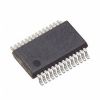dsPIC30F6010: Features: DSP Engine Features:• Dual data fetch• Accumulator write back for DSP operations• Modulo and Bit-Reversed Addressing modes• Two, 40-bit wide accumulators with optio...
floor Price/Ceiling Price
- Part Number:
- dsPIC30F6010
- Supply Ability:
- 5000
Price Break
- Qty
- 1~5000
- Unit Price
- Negotiable
- Processing time
- 15 Days
SeekIC Buyer Protection PLUS - newly updated for 2013!
- Escrow Protection.
- Guaranteed refunds.
- Secure payments.
- Learn more >>
Month Sales
268 Transactions
Payment Methods
All payment methods are secure and covered by SeekIC Buyer Protection PLUS.

 dsPIC30F6010 Data Sheet
dsPIC30F6010 Data Sheet







